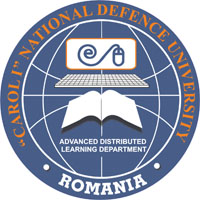FLIPPED LEARNING, GEOGEBRA AND WIRIS ON MOODLE PLATFORM, OR ARGUMENTS IN FAVOUR OF INTEGRATING IN EDUCATION
FLIPPED LEARNING, GEOGEBRA AND WIRIS ON MOODLE PLATFORM, OR ARGUMENTS IN FAVOUR OF INTEGRATING IN EDUCATION
Author(s): Roxana NEMEŞU, Adriana PetroviciSubject(s): Education
Published by: Carol I National Defence University Publishing House
Keywords: Flipped Learning; Flipped Classroom; GeoGebra; Wiris; Moodle
Summary/Abstract: The paper introduces the concept of Flipped Learning and the results of implementing the Flipped Classroom strategy in the collaborative process of teaching-learning-assessment of mathematics, between a group of teachers from our high school and their students. In recent years, Flipped Classroom strategy has been increasingly used in schools, colleges and universities in many countries. The concept of Flipped Learning - reverse learning and its practical implementation are the result of the experimental efforts and creative innovations of many educational classroom activities from the teacher towards the student, as efficiently as possible. The novelty of Flipped Classroom strategy - reverse classroom is that the basic content of a curricular topic/key concept, which has to be taught and learnt, is structured by the teacher in a digital teaching scenario and online videos which can be watched by students at home, at their own pace, whenever necessary, until they fully reach its understanding. The strategy minimizes the time allocated to instruction and maximizes the time required by teacher-students interaction, in order to reach the proper level of understanding of the content and carry out a variety of practical activities aimed at assisting the students in acquiring and effectively using it, thus ensuring their progress and performance. The concept of "reversal" refers to the fact that the teaching process takes place at "home" and not in the traditional classroom. The "homework" consists of students taking charge of their own learning through creative efforts and the traditional home assignments, whose purpose is to implement and reinforce the content, are done in the classroom through collaborative work. The focus of this paper is on the practical use of the methodology promoted by the Flipped Classroom strategy, in symbiosis with the opportunities of Moodle platform and the formative benefits of GeoGebra software, complemented by those of the Wiris plugin. The development of on-demand learning content, one of the challenges of the Flipped Classroom strategy, supplement the arguments provided in the paper, in order to encourage teachers to integrate ICT resources in their teaching. The last section of the paper presents the benefits this new strategy has to offer to students’ level of motivation, their interest in re search and to learning efficiency. All these are achieved by the teachers through developing a teaching scenario for mathematics in an e-learning environment, personalized and enriched by various Web resources, depending on the characteristics and needs of the students they collaborate with.
Journal: Conference proceedings of »eLearning and Software for Education« (eLSE)
- Issue Year: 11/2015
- Issue No: 01
- Page Range: 612-619
- Page Count: 8

